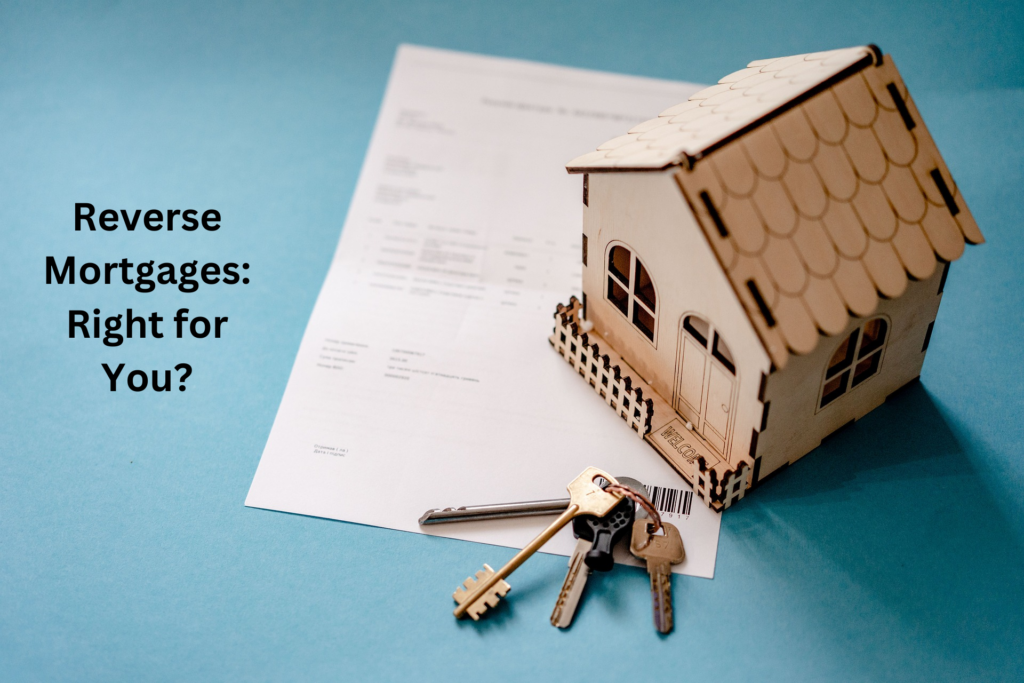As you reach retirement, you may feel asset-rich but cash-poor. Your house, probably your most valuable asset, has equity built up over the years; however, all that wealth is tied up in bricks and mortar.

This is where reverse mortgages come into play. These financial products have been gaining popularity among seniors looking to tap into their home equity without selling their property. But are reverse mortgages a shrewd economic move or a gamble of the riskiest kind? Here, we’ll take a closer look at reverse mortgages’ nuances and how they help you decide whether they fit your retirement strategy.
What Is a Reverse Mortgage?
First, let’s talk about exactly what a reverse mortgage is and how it works.
Definition and Basic Concept
A reverse mortgage is a special kind of loan that enables homeowners aged 62 years and above to borrow against equity in their homes. Unlike in the case of a traditional mortgage, wherein you make monthly payments to the lender, in the case of a reverse mortgage, the lender makes payments to you.
How It Works
- Eligibility: You must be 62 or older and have significant equity in your home.
- Loan Amount: You can determine how much you can borrow by considering your age, the value of your home, and the prevailing interest rates.
- Payment Options: You can receive the cash value as a single payment, steady monthly payments, a line of credit, or all three combined.
- Repayment: You will not have to repay this loan unless you sell your home, move out, or die.
Types of Reverse Mortgages
- Home Equity Conversion Mortgages (HECMs): Federally insured and most common.
- Proprietary Reverse Mortgages: Private loans for higher-value homes.
- Single-Purpose Reverse Mortgages: These are from some state and local government agencies for single purposes.
Pros of Reverse Mortgages
Reverse mortgages have the potential to benefit seniors in many ways. Let’s examine the advantages.
Access to Home Equity Without Selling
Equally important, a reverse mortgage has the advantage of allowing you to tap into your home’s equity without leaving your home or ever having to move.
How It Helps
This could be helpful if one:
- Wants to stay in his or her current home
- Needs extra money to augment his or her retirement
- Has minimal savings or other assets
Real-Life Scenario
Think of a retired couple who enjoys their residence but suffers from monthly payments. A reverse mortgage allows additional income to pay bills, health expenses, or even home improvements while continuing to reside in their loved house.
No Month-to-Month Mortgage Payments
In the case of a reverse mortgage, you are not required to pay the mortgage on a month-to-month basis.
Financial Impact
This will save you several thousands of dollars a month, which you may invest in other needs. However, you will pay property taxes, insurance, and home maintenance.
Budgeting Dividend
Removing mortgage payments from your budget will help simplify your budget and could improve your lifestyle during your retirement.
Non-Recourse Loan
Reverse Mortgages are non-recourse loans, and this feature provides worthwhile protection to the borrowing and their heirs.
What It Means
You or your heirs will not be liable to pay the difference if the home’s value decreases or the loan balance exceeds the value of your home.
Peace of Mind
It gives you or your family peace of mind, knowing that you won’t be burdened with debt exceeding your home’s value.
Flexibility in Receiving Funds
Reverse mortgages give you different ways of receiving your funds, affording flexibility to suit different financial needs.
A Lump sum Fixed monthly payments Line of credit Any combination of the above
How to Tailor Your Approach This level of flexibility will let you tailor the reverse mortgage to your specific financial situation and goal. For example, the line of credit may serve as an emergency source of funds, while the month-to-month payments may supplement your traditional retirement income.
Tax Benefits
Reverse mortgage proceeds are generally not considered taxable income and, hence, advantageous from a tax point of view.
Tax Implications
The IRS views the cash you get from a reverse mortgage as a loan advance, not income. Thus, it typically doesn’t affect your Social Security or Medicare benefits.
Consult with a Tax Professional
While there are a few tax benefits, it’s always best to speak with a tax professional about how any reverse mortgage would impact one’s tax situation.
Cons of Reverse Mortgages
While there is potential for significant benefits, reverse mortgages also have drawbacks.
Expensive Costs and Fees
Among all the disadvantages of reverse mortgages, cost and fees are the most substantial. There are various types of these fees, including:
Origination fees
Mortgage insurance premiums
Closing costs
Servicing fees
Long-Term Impact
These can drastically cut into how much equity you will have. Over time, they can chip away at the underlying value of your home and perhaps leave you with less to bequeath to your heirs.
How Interest Accumulates
Reverse mortgage -Balance is charged interest and then tacked onto what you owe.
Compounding Effect
Because you’re not making payments, the loan balance grows over time. That means the amount you owe can increase substantially, mainly if you live in the home for many years after taking out a reverse mortgage.
Equity Erosion
The growing loan balance reduces your home equity, which could impact your long-term financial strategy or plans to leave an inheritance.
Possible Impact on Government Benefits
Although reverse mortgage proceeds are generally not considered income for Social Security or Medicare purposes, they affect some need-based governmental assistance programs.
Programs That May Be Affected
Medicaid
Supplemental Security Income (SSI)
Careful Planning Required
If you rely on these programs now or may need them in the future, you must understand how a reverse mortgage will impact your eligibility.
Responsibility for Property Charges
Since you will not pay the mortgage with a reverse mortgage, you will continue to pay other property expenses.
Ongoing Expenses
- Property taxes
- Homeowners Insurance
- Home maintenance and repair
Default Risk
Failure to pay these costs may trigger default on reverse mortgages, which could lead to foreclosure.
Complexity and Potential for Misunderstanding
A reverse mortgage is a complicated financial product that is hard to comprehend fully.
Common Misconceptions
Assuming the bank automatically takes ownership of the house
Assuming the amount borrowed does not increase
Failure to understand the conditions of repayment
Education is Key
Consult as much as possible and even take professional advice before entering into a reverse mortgage.
Impact on Heirs
A reverse mortgage will impact how you can pass your home down to your heirs.
Options for Heirs
When the loan is due-usually when you die or move out-your heirs can:
Pay the loan balance themselves and retain ownership of the house
Sell the house to cover the loan
Allow the lender to take possession of the home
Risk of Inheritance Loss
If the loan amount exceeds the home’s value, your heirs may lose whatever equity they had counted on inheriting.
Who Might Benefit from a Reverse Mortgage?
Though reverse mortgages are not suited for all, they can serve very useful purposes under certain conditions.
Seniors Who Wish to Age in Place
If you insist on staying in your current home and need additional income, a reverse mortgage could be a good option.
Considerations
Emotional attachment of a high degree with the home
Home already adapted for ageing needs
Avoidance of stress associated with moving
Those with Limited-Income Retirement
A reverse mortgage can make up the difference if your retirement nest egg, combined with Social Security, is not enough to meet your needs.
How the Proceeds Might be Used
- Adding to monthly income
- Financing healthcare
- In-home care expenses
Homeowners Whose Wealth Is Tied Up in the Home
If most of your assets are tied up in your home, which is a very common problem, mortgages could unlock that equity without you having to leave your home.
The Best Candidates
Those in long-term homes where the appreciation of property values is excellent; Individuals who have paid off their mortgage or have very little outstanding balance
Those Who Do Not Have Heirs or the Desire to Leave Home as Inheritance
If you don’t have to leave your home to heirs, you will be more comfortable considering tapping into your home’s equity through a reverse mortgage.
Considerations
Family situation; Other assets available for inheritance
Personal values and priorities
Who Should Not Take Out a Reverse Mortgage?
Reverse mortgages are not for everyone. Following are some scenarios where this option may not be the best choice.
Those Considering Moving Soon
If you are likely to move soon, a reverse mortgage is probably not a good idea.
Why to Avoid
High upfront costs
The possibility of owing more than your home is worth if property values decline.
Homeowners with Other Financial Options
If you have other assets or sources of income, it might be wise to consider those first before considering a reverse mortgage.
Other Options You Might Want to Consider
- Downsizing into a smaller house
- Regular home equity loans and lines of credit
- Selling and renting
Those Who Desire to Leave the House to their Heirs
If you want to be able to leave your home to your children or other heirs, a reverse mortgage might make this more challenging.
Issues You Might Expect
Inheritance may be lower or zero.
Heirs may feel obligated to stress themselves out trying to pay off the loan so that they can retain the house themselves.
Owners with Limited Equity
If you don’t have much equity in your home, you might not be able to qualify for a reverse mortgage, and the benefits will be slim.
Something to Think About
The balance of your current mortgage
- Home’s appraised value
- Age and other qualifying factors
Alternatives to Reverse Mortgages
Before getting a reverse mortgage, consider a few options that could satisfy your financial needs.
Refinancing Your Current Mortgage
If you still have a mortgage, the most common option, refinancing to a lower interest rate, might be to decrease your monthly payments.
Possible Advantages
- Smaller payments
- Possibly cash out to access equity
Disadvantages
- Still must make payments
- Closing costs and fees
Home Equity Loan or Line of Credit
These options allow you to borrow against your home’s equity without the complexity of a reverse mortgage.
How They Work
Home Equity Loan: Borrow a lump sum and repay over time
Home Equity Line of Credit (HELOC): Borrow as needed up to a certain amount
Considerations
Require monthly payments
Can have fewer fees than reverse mortgages
Downsizing
Sell your current house and move into a less expensive one, which could free up some equity and reduce expenses.
Potential Benefits
- Equity without having to take out a loan
- Reduced maintenance and utility costs
Cons
- Emotional headache of moving
- Transaction costs-realtor’s fees, moving costs
Renting Out Part of Your House
If you have the space, renting out a room or part of your home can generate additional income.
Benefits
- No debt creation with a regular income
- Companionship possibly available
Considerations
- Privacy
- Landlord responsibilities
How to Decide if a Reverse Mortgage is Right for You
If you are considering a reverse mortgage, here are steps that will help you arrive at a proper decision:
- Assess Your Financial Situation: Currently, consider your income, expenses, assets, and debts.
- Consider Your Long-Term Plans: Consider how long you plan to stay in your home and whether you wish to leave an inheritance.
- Explore Alternatives: Investigate other options to get cash or reduce expenses.
- Understand the Costs: Be aware of all the fees and costs associated with a reverse mortgage.
- Consult Professionals: Have discussions with a financial analyst, tax professional, and perhaps an elder law attorney.
- Speak with Your Family: Discuss your intentions with your children or any other heirs that would be impacted.
- Seek Counseling: Reverse mortgage counselling, which is required for HECM reverse mortgages, is done through a HUD-approved counsellor who will inform you of many things.
- Shop Around: If you decide to proceed, compare offers from multiple lenders.
Conclusion
Where appropriate, a reverse mortgage can be a valuable financial tool for some seniors. It allows access to home equity without selling or moving. Reverse mortgages can add income in retirement, pay for unexpected expenses, or finance accessibility modifications to age in place. However, they may also include large costs and complicated terms that could impact inheritance plans.
A reverse mortgage should not be entered into lightly. It requires caution when considering a comprehensive view of your financial situation, long-term goals, and alternatives. What works for one retiree may not be the best choice for another.
Remember, a reverse mortgage is a severe financial decision that could have long-lasting consequences for your financial security and even your legacy. Study carefully, consult financial experts, and share the decision with your family. You’ll be much better prepared to decide whether this reverse mortgage is right for you.
After all, the goal is to ensure the retirement period is comfortable and secure, whether that includes a reverse mortgage or another financial strategy; it depends on your circumstances and priorities. If due care is taken in planning and choosing wisely, one can choose the path that better supports retirement dreams and financial well-being.






